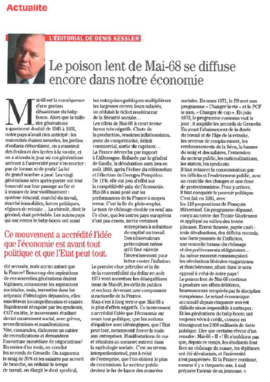The slow poison of May 1968 is still spreading through our economy - EDITORIAL FOR CHALLENGES BY DENIS KESSLER
April 6, 2018

Chairman & CEO of SCOR, Denis Kessler publishes an editorial piece in the French weekly Challenges, covering economic, political and financial current events in France and worldwide.
May 1968 in France was the result of the country’s disastrous management of the baby boom. Although births nearly doubled between 1945 and 1965, our country did not think ahead. Maternity wards were saturated, kindergartens were overflowing, elementary schools and high schools were being built one after another, but the country waited until these baby boomers arrived at the university door, where there was a lack of both space and professors, before it started to worry about them. By the strength of their numbers, the baby boomers born during the 20 years following the Second World War have changed everything as they have moved through life: the educational system, the job market, the real estate market, the balance of political power, the pension system. The chaos that General de Gaulle predicted was … predictable. The baby boom also shook up other countries, but none so much as France. Many of the baby boomers’ aspirations were legitimate, especially the societal ones, but enveloped in outdated ideologies, they inspired bewilderment and fear.
Labor unions quickly jumped into the breach, with the CGT leading the pack, and the student protest movement became a labor movement, replete with strikes, demands and demonstrations. “Quick, comrades, let’s draw up a set of demands and call for immediate negotiations.” In less than a month, the Grenelle Agreements were signed. The minimum wage was increased by 35%, and salaries in general were boosted by industry-wide agreements. The workweek was shortened, union rights expanded, public-sector companies became ever more generous vis-à-vis their employees, health insurance contributions were reduced, and so on.
The short-term consequences of May 1968 were very negative. France suffered a drop in production, inflationary pressure, a loss of competitiveness, trade deficits, capital flight, current account deficits … and the list goes on. France lost ground with respect to Germany. President de Gaulle refused to devalue the franc, but it was devalued anyway in August 1969, following the “No” vote on the referendum, de Gaulle’s resignation and the election of Georges Pompidou. The 11% devaluation did little to improve the French economy’s price competitiveness.
May 1968 also held back France’s medium-term performance. Full employment came to an end. The unemployment rate doubled in nine years. In contrast to other European countries, the high cost of labor in France prompted companies to substitute capital for labor. Some observers even went so far as to say that investment would have to be slowed so as to combat inflation. The first oil crisis and the end of dollar convertibility in August 1971 accentuated the imbalances caused by May 1968. Fiscal and social security deficits became structural components of the French financial landscape.
But the most negative effects of May 1968 were the long-term ones. The May 1968 movement lent credence to the notion that the economy is first and foremost political, that equilibrium is ideological, that the government is all powerful, and in particular that it can bring companies to heel. Street demonstrations and summit meetings became fundamental to the belief in social progress. It was at the industry level, not at the level of individual companies, that real concessions were to be had. The public sector became the spearhead of social progress. In March 1971, the Socialist Party introduced its program, called “Changer la vie” (“Changing lives”), while the Communist Party launched its own version, dubbed “Changer de cap” (“Changing direction”). In June 1972, they produced the “Common Program”, an extension of the Grenelle Agreements. The workweek was to be further shortened and the retirement age lowered, while replacement income, health insurance reimbursements, the minimum wage and salaries in general were all to be increased. The public sector was to be expanded, nationalization extended, special status granted, labor unions protected. The conventional wisdom held that consumption must be boosted by deficit spending and public debt, combined with exchange controls and a dose of protectionism. To implement the program, political power had to be gained. This was achieved in 1981, with François Mitterrand’s celebrated “110 propositions”. The program was outdated, conceived in the 30 boom years following the war and applied in the not-so-glorious years that followed. It was a colossal error, and France paid dearly for it: three devaluations, record deficits, a spike in inflation, and further increases in unemployment, taxes and mandatory social security contributions. Meanwhile, the Reaganite and Thatcherite free-market revolutions were starting, and moving in the opposite direction!
The slow poison of May 1968 is still producing its deleterious effects, tempered, fortunately, by EU discipline. The economic lag accumulated over the past 50 years will be difficult—if not impossible—to erase. And the baby boom generation has always lived on credit, as evidenced by the EUR 2,000 billion in public debt. Yet some people are dreaming of a remake, a May 1968 “2”! Lest we forget, since May 1968, students have been faced with mass unemployment, devalued degrees and an impoverished university system. And as it did 50 years ago, France continues to plan poorly for the future of its young people.
